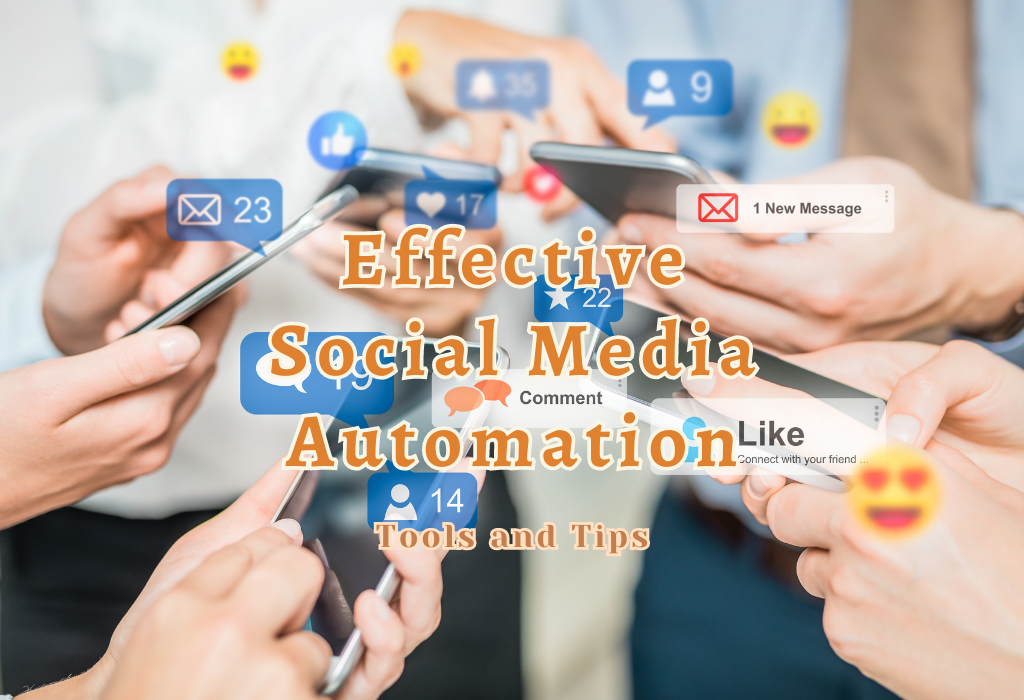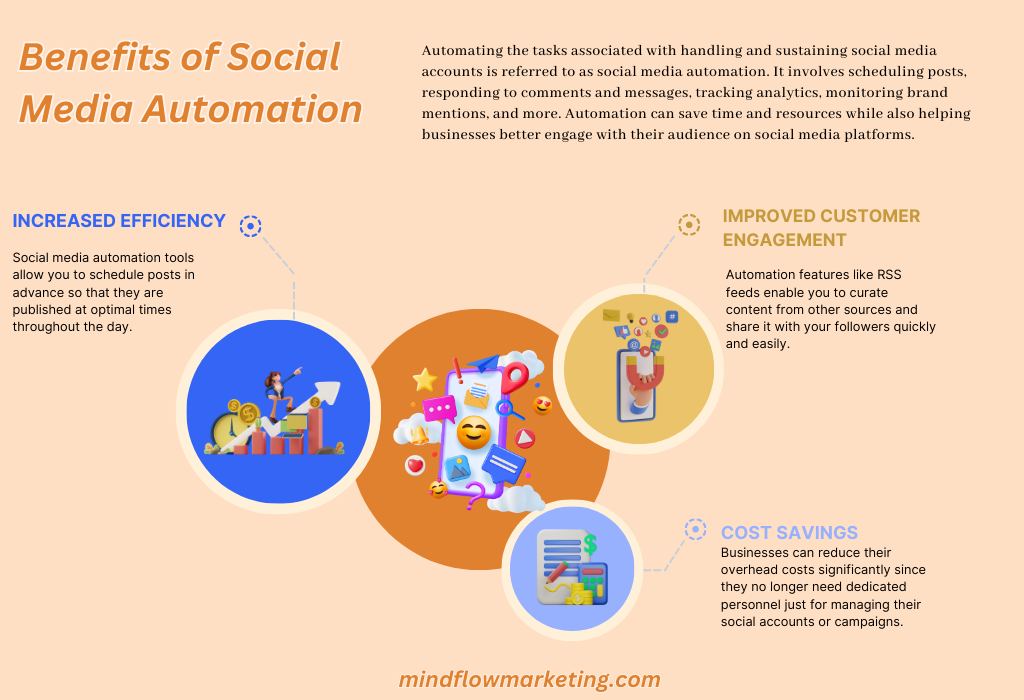Social media automation has become an essential aspect of modern marketing strategies. The increasing range of social media channels and the need for fresh content has led to marketers relying on automation tools to optimize their efforts and make them more effective.
To help streamline your efforts and maximize efficiency, this guide will explore the benefits and challenges associated with automating social media tasks. We’ll delve into various types of social media automation tools available in the market, offering insights on how to choose one that best suits your needs.
Additionally, you’ll learn about best practices for using these tools effectively while maintaining a genuine connection with your audience. Finally, we will discuss how to measure success when implementing social media automation into your strategy so you can ensure continuous improvement and growth in your online presence.

More Resources :
What is Social Media Automation?
Automating the tasks associated with handling and sustaining social media accounts is referred to as social media automation. It involves scheduling posts, responding to comments and messages, tracking analytics, monitoring brand mentions, and more. Automation can save time and resources while also helping businesses better engage with their audience on social media platforms.
Benefits of Social Media Automation

Automating certain tasks on social media can help save time and energy while increasing efficiency. Automating social media tasks can provide many advantages, including saving time and energy while improving productivity.
Increased Efficiency
Social media automation tools allow you to schedule posts in advance so that they are published at optimal times throughout the day. This means that you don’t have to be constantly checking your accounts or manually posting updates – it’s all taken care of automatically. You can also set up automated responses for customer inquiries or use a bot builder to create custom bots for engaging with customers on various platforms such as Twitter and Facebook.
Improved Customer Engagement
Automation features like RSS feeds enable you to curate content from other sources and share it with your followers quickly and easily. Additionally, automated responses allow customers to get quick answers without having to wait for someone from your team to respond manually. By providing rapid responses to customers, trust can be built between you and your clientele.
Cost Savings
By automating certain tasks such as post scheduling, content creation, unified social inboxes, etc., businesses can reduce their overhead costs significantly since they no longer need dedicated personnel just for managing their social accounts or campaigns. Furthermore, there are many free tools available online that provide basic functionality; these tools often come with additional paid plans if more advanced features are needed.
Challenges of Social Media Automation
The potential challenges associated with social media automation can be daunting. Businesses that fail to plan properly may find themselves overwhelmed by the complexities of automated social media.
#1. Personalization is highly required
Without personalization, automation tools can’t effectively deliver content that resonates with customers and followers. Automation tools are designed to make repetitive tasks easier, but they don’t always provide personalized messages or content that resonates with customers and followers. This means that businesses must take extra care when setting up their campaigns to ensure they’re providing content that is tailored to their target audience.
#2. Results need to be tracked
Another challenge is tracking results from automated campaigns. It can be difficult for businesses to measure the success of their efforts if they don’t have access to detailed analytics or metrics about how users are engaging with their posts and ads. To get accurate data, businesses need access to sophisticated tools such as Google Analytics or Sprout Social Insights – both of which offer insights into user engagement levels across different platforms and channels.
#3. Extensive training is required
Some automation tools necessitate a great deal of time and resources to be properly implemented, especially those that involve intricate algorithms or AI-driven technologies such as natural language processing (NLP). These systems often require extensive training before they can accurately recognize patterns in customer behavior and respond accordingly, making it difficult for businesses without technical expertise or resources on hand.
#4. Humanized touch is necessary
There’s also the risk that automated campaigns will come off as robotic or impersonal if not executed correctly – something which could potentially damage relationships between brands and customers over time if left unchecked. To avoid this issue, it’s important for companies using automation tools to regularly review their settings and adjust them according to feedback from users so that each message feels more humanized rather than robotic or generic.
The challenges of social media automation are numerous and can be difficult to navigate. Fortunately, there exists a range of resources to assist in simplifying the process and enabling content creators, entrepreneurs, social media administrators, and website proprietors to initiate automation of their postings. Next, we’ll look at some of these types of tools in more detail.
Types of Social Media Automation Tools
Social media automation tools are essential for businesses that want to maximize their online presence and build a following around their brand or niche.
There are many different types of social media automation tools available on the market today, each with its unique features and benefits.
Scheduling Tools
Scheduling tools allow users to plan out their social media posts ahead of time so they can be published at optimal times throughout the day without having to manually post them every single time. Popular scheduling tools include
These platforms also offer additional features such as tracking analytics and managing multiple accounts from one dashboard.
Analytics Tools
Analytics tools provide insights into how well your content is performing across various channels by measuring metrics like reach, engagement rate, clicks per post, etc.
Popular analytics tools include
These platforms help you gain valuable insights into what type of content resonates best with your audience so you can adjust your strategy accordingly.
Influencer Marketing Platforms
Influencer marketing platforms enable brands to identify influencers who have an engaged following within their target demographic or industry verticals to promote products or services through sponsored campaigns or collaborations.
Popular influencer marketing platforms include:
which all offer advanced search capabilities as well as detailed reporting features for analyzing campaign performance data over time.
Content Curation Tools
Content curation tools help marketers discover relevant content from other sources that are related to their brand’s topic area to create more engaging experiences for followers on social networks like Twitter or LinkedIn Groups.
Examples of popular content curation software solutions include:
Best Practices for Using Social Media Automation
Still, it’s essential to grasp the optimal techniques for utilizing this tech to maximize its potential.
The first step when utilizing social media automation is setting goals. Before you start automating any tasks on your platforms or accounts, determine what outcomes you want from your campaigns and create measurable objectives. This will help ensure that all of your automated activities are aligned with your overall strategy and help you achieve specific results.
Creating a content calendar is also essential for effective social media automation. A well-thought-out plan should include scheduling posts ahead of time as well as responding to comments in real-time. With an organized calendar in place, you can easily track which posts have been published and which ones still need attention—allowing you to make sure everything runs smoothly without missing anything important along the way.
When selecting an automation tool to manage multiple accounts across different networks, opt for one that enables integration between them so all information can flow seamlessly from platform to platform without needing manual input into each account every time something changes or needs updating. Additionally, select a solution with features such as analytics reporting capabilities so you can keep tabs on how well each campaign has performed over time and make necessary tweaks if needed.
Including relevant hashtags or mentions is essential when using social media automation tools to ensure users feel heard and connected with the brand. Keywords should be incorporated in messages so that people know they’re being responded to by someone who understands their interests or concerns, rather than a robotic response generated solely from software algorithms.
To create relationships over time, personalizing messages is an absolute must; this will help prevent users from feeling disconnected due to generic responses sent out automatically. All of these practices combined can make for a successful campaign that yields desired results.
How to Measure Success with Social Media Automation
Measuring success with social media automation is an important part of any content marketing strategy. Automation tools can help you save time and increase your reach, but it’s important to measure the results so that you know if your efforts are paying off. Analyzing indicators like engagement and scope should be done to assess the effectiveness of social media automation.
Engagement rate measures how many people interact with your posts in some way – liking, commenting, or sharing them on their pages. A high engagement rate indicates that people find your content interesting enough to take action on it. Reach tells you how many people saw your post in total – even if they didn’t interact with it directly. This metric gives you a good idea of how far-reaching each post was across different platforms and networks.
To get a better understanding of which posts were most successful, track these two metrics over time for each post type (text-based updates versus images or videos). You can also compare these numbers against industry benchmarks to see where you stand compared to other brands in similar industries or niches.
When measuring success with social media automation, don’t forget about conversions as well. Look at the number of leads generated from automated campaigns and measure the ROI (return on investment) by tracking sales associated with those leads over time. If possible, try setting up conversion tracking codes within each campaign so that you can track specific actions taken by users after clicking through from a post or ad created via automation software.
Finally, pay attention to sentiment analysis when evaluating the performance of automated campaigns – especially when using natural languages processing algorithms like chatbots and voice assistants for customer service purposes. Sentiment analysis will tell you whether customers had positive experiences interacting with bots or not; this data can be invaluable for making improvements going forward.
FAQs about Social Media Automation
Conclusion
Automation of social media can be a useful asset to content marketers, entrepreneurs, bloggers, social media managers, and website owners seeking to expand their digital footprint. It offers numerous benefits such as saving time and increasing efficiency while also helping to build an engaged audience around your brand or niche. Despite the advantages of social media automation, it is important to be aware of potential difficulties to ensure successful campaigns. With the right tools and best practices for implementation in place, you’ll be able to measure success from your efforts with social media automation more easily than ever before.
Maximize your online presence and build a strong following around your brand or niche with mindflowmarketing’s social media automation solutions. Leverage our advanced tools to quickly curate, schedule, and publish content that resonates with your target audience.